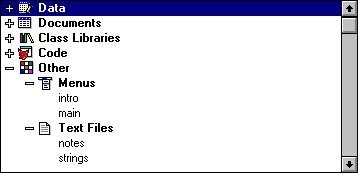
Use the Project Manager to organize and manage your files in projects. A project is a collection of files, data, documents, and Visual FoxPro objects that is saved as a file with a .pjx extension. When the Project Manager window is active, Visual FoxPro displays the Project menu on the menu bar.
The items in the Project Manager are organized in an outline-like view that you can expand or collapse. A plus sign appears next to a symbol if there are one or more items of that type in the project. Click the plus sign next to a symbol to see items in the list. Click the minus sign to collapse an expanded list.
As with toolbars, you can dock the Project Manager by dragging it to the top of your screen or double-clicking the title bar. When it is docked, it automatically collapses and shows only the tabs.

Display items by category. When the Project Manager is collapsed, you can tear off tabs by dragging them away from the Project Manager. To replace a tab, just drag it back to its original position, or click the Close box.
Click the pushpin button to keep a tab on top of other windows.

Expands and collapses the Project Manager. When the Project Manager is collapsed you can "tear off" tabs by placing the mouse pointer over a tab and dragging it away from the Project Manager.

Lists the items contained in the project in an outline-like view. Icons appear to the left of the item to identify its type.
The symbol  appears next to items that are excluded from the project.
appears next to items that are excluded from the project.
When files are included in the project, they are compiled into a single .app file when the project is built. All included files are read-only at run time. In the Programs, Forms, Queries, or Menus group, the name of the main program file appears in bold.
For further information, see "Referencing Modifiable Files" in Chapter 13, Compiling an Application, in the Programmer's Guide.
New
Creates a new file or object. This button has the same effect as the New File command on the Project menu. The new file or object's type is the same as that of the currently selected item.
Note Files created from the File menu are not automatically included in a project. Files created from the New File command on the Project menu (or the New button in the Project Manager) are automatically included in a project.
Add
Adds an existing file to the project. This button has the same effect as the Add File command on the Project menu.
Modify
Opens the selected item in the appropriate designer. This button has the same effect as the Modify File command on the Project menu.
Browse
Opens a table in a Browse window. This command has the same effect as the Browse File command on the Project menu, and is enabled only when a table is selected.
Close
Closes an open database. This command has the same effect as the Close File command on the Project menu, and is enabled only when a table is selected. If the selected database is already closed, this button changes to Open.
Open
Opens a database. This command has the same effect as the Open File command on the Project menu, and is enabled only when a table is selected. If the selected database is already open, this button changes to Close.
Remove
Removes the selected file or object from the project. Visual FoxPro asks you if you want to just remove the file from the project or if you want to remove it from the project and delete it from disk. This command has the same effect as the Remove File command on the Project menu.
Build
Builds a project or application and can also build an executable or Automation server. This command has the same effect as the Build command on the Project menu.
Preview
Displays the selected report or label in Print Preview mode. Enabled when you select a report or label in the Project Manager. This command has the same effect as the Preview File command on the Project menu.
Run
Runs the selected query, form, or program. Enabled when you select a query, form, menu, or program in the Project Manager. This command has the same effect as the Run File command on the Project menu.
For more information, see "Referencing Modifiable Files" in Chapter 13, Compiling an Application, in the Programmer's Guide.